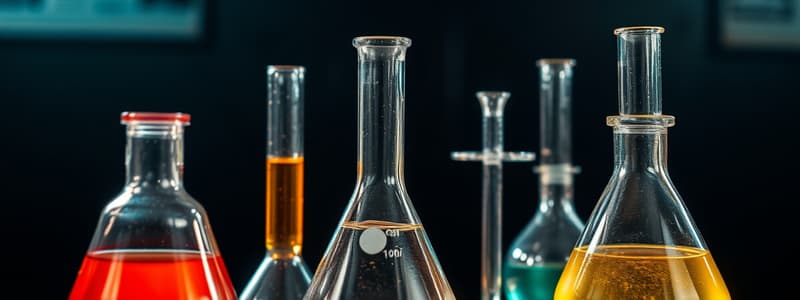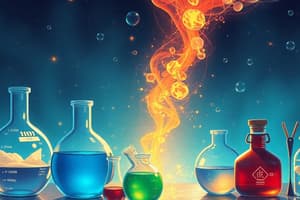Podcast
Questions and Answers
Why are salt and sugar classified as chemicals?
Why are salt and sugar classified as chemicals?
- They are made from natural resources.
- They are only present in food products.
- They are substances that have a defined composition. (correct)
- They consist of compounds that can be broken down.
What does the scientific method primarily involve?
What does the scientific method primarily involve?
- Relying on personal experiences for decision making.
- Using observations, hypotheses, and experiments to investigate phenomena. (correct)
- Ignoring data and focusing solely on theories.
- Making random guesses to solve problems.
Which of the following best describes a hypothesis in the context of scientific research?
Which of the following best describes a hypothesis in the context of scientific research?
- A confirmed fact within scientific literature.
- A conclusion drawn from extensive data analysis.
- A theory that has been universally accepted.
- An assumption that is tested through experimentation. (correct)
Which of the following is an example of an observation?
Which of the following is an example of an observation?
Which of the following statements accurately defines chemistry?
Which of the following statements accurately defines chemistry?
Flashcards are hidden until you start studying
Study Notes
Key Concepts in Chemistry
- Salt and sugar are classified as chemicals because they are composed of specific chemical substances and structures.
- The scientific method facilitates decision-making by providing a structured approach for observing phenomena, forming hypotheses, conducting experiments, and drawing conclusions.
Study Strategies for Learning Chemistry
- Regular review of concepts and terms can solidify understanding and retention.
- Engaging in hands-on experiments promotes active learning and application of theoretical knowledge.
- Utilizing visuals, such as diagrams and charts, helps in grasping complex chemical concepts.
Definitions of Key Terms
- Scientific Method: The process involving observation, hypothesis formulation, and experimentation to investigate natural phenomena.
- Experiment: A controlled procedure used to test a hypothesis and gather data.
- Hypothesis: A tentative explanation for a natural phenomenon that can be tested through experimentation.
- Theory: A well-substantiated explanation of some aspect of the natural world, consistently validated by experiments.
- Chemistry: The branch of science concerned with the study of substances, their properties, and interactions.
Identification of Chemicals
- Aluminum is a chemical element.
- Heat is not classified as a chemical; it is a form of energy.
- Sodium fluoride, often found in toothpaste, is a chemical compound.
- Ammonium nitrate, commonly used in fertilizers, is a chemical.
- Time is not a chemical; it is a measurement of duration.
Classification of Observations, Hypotheses, and Experiments
- Sunlight is necessary for plant growth: Observation (O)
- Observation of shorter plants in shade versus sun: Observation (O)
- Experiment measuring growth of plants covered with aluminum foil: Experiment (E)
- Experiment involving fertilizer application to plants: Experiment (E)
- Hypothesis that ozone interferes with photosynthesis and slows plant growth: Hypothesis (H)
- Observation of ozone causing brown spots on leaves: Observation (O)
Studying That Suits You
Use AI to generate personalized quizzes and flashcards to suit your learning preferences.




